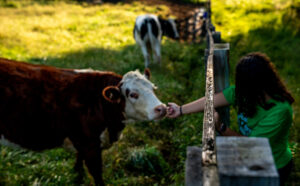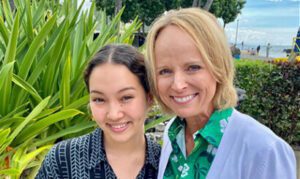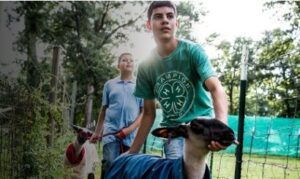Where did your 4‑H story begin, and what was the experience like for you growing up?
Jehiel Oliver (JO): I was a part of 4‑H from the first through third grades in Cleveland, Ohio. It was my teacher who was administering 4‑H curriculum and introduced me to the 4‑H program. There were so many different things we learned, including agriculture. 4‑H is what introduced me to agriculture. I’m from the east side of Cleveland, and we don’t have farms. So that was one of the first introductions to figuratively and literally getting my hands dirty.
Who were some of your inspirations growing up?
JO: Family is always a primary source of inspiration. I come from a very hardworking family that always prioritizes doing things with your time, like taking action within your community. That has defined my career. Even where I am today—and my decision to go into investment banking—was driven by a gap that I saw within my community. I saw people who didn’t understand finance and didn’t have the same resources other communities had. So I figured that if I can develop this skill set, I can be of value within my community. That evolved to broadening my perspective globally. I can use finance to benefit global communities, which led me into agriculture—using finance to help farmers across Africa and parts of Asia where Hello Tractor operates.
Can you share some of your family history in agriculture?
JO: My great uncle, who I knew very well, used to work at John Deere as a technician for over 30 years in Alabama. And what was inspiring for me to learn was he used to volunteer at Tuskegee University towards the end of George Washington Carver’s career. He is also responsible for introducing many agriculture best practices that we know of today. He worked as a Cooperative Extension agent with Thomas Monroe Campbell, the first Cooperative Extension Agent and helped launch the Extension System. Together, they supported ex-slaves and Black sharecroppers to introduce best practices into their farming activities. That work allowed them to grow more, earn more income, and be better stewards of the land. And I’m doing the same thing in countries in Africa and Asia, which kind of brings his legacy full circle.
Why do you think it’s important to tell stories like that of your uncle and other African-American farmers and pioneers in agriculture?
JO: Our history often gets overlooked. That’s why Black History Month exists because those stories aren’t always being told. However, in understanding those stories, you begin to see yourself in new spaces because you can trace back. I have a legacy in this industry. It wouldn’t be so difficult for a young person to see themselves as a farmer if they knew that some of the best farmers in American history were African Americans. I think having that understanding is important. It certainly gave me a lot of confidence as a professional and brought even more excitement to the work that I was doing.
What inspired you to start Hello Tractor?
JO: I wanted to be as impactful as possible, and I’m also a big believer in using commercial markets to solve massive problems. You scale the solution and address issues by leveraging commercial players who have financial interests in supporting you in solving the problem. I started my career in finance, where I eventually worked in microfinance—which is popular in parts of Asia and Africa. These were banks that generally serve lower-income populations to provide loans and other financial services that typically aren’t extended to those populations. That attracted me to this idea that I can use my financial background to support low-income communities in these emerging markets, leading to an awareness of farmers’ challenges. Many of the borrowers in these banks are low-income farmers who make their money on the farm. However, many of the microfinance institutions would not lend to agricultural activities because of the risks. That piqued some curiosity on supporting farming in these developing countries and supporting the farmer while minimizing the risk. I landed on mechanization, and as a result, founded Hello Tractor.
Farmers pay for mechanization services every year. It’s something that they need as it increases their income, yield and productivity. It also addresses some of the changes affecting farmers in emerging markets, such as rapid urbanization and aging farm populations, and depleting laborers. So, machines are needed now more than ever, and Hello Tractor was my solution to this labor gap in these rural communities. If you’re growing on a small plot of land—like most of our farmers do—you can’t afford to own your equipment. But having access to a tractor is just as good. We built a circular economy model around this concept that farmers can book services from a tractor owner that will be affordable, reliable and convenient. And as those tractor owners deliver those services, they can earn income. It’s been a little over six years now, and we’ve seen some extraordinary success stories coming out of the work that we’re doing through Hello Tractor.
What are some ways we can provide young people with meaningful experiences and opportunities to discover their passion for agriculture, especially when they feel like those opportunities are out of reach?
JO: I think there’s a wealth of opportunity for a young person, especially now with technology and innovation taking hold in agriculture. Now is the time to get in front of the innovation curve, learn as much as you can, and bring those learnings back to the farm. I think curiosity will be an essential ingredient to their success as they think about a career in agriculture. There are so many ideas that can fill the gap.
What advice do you have for Black 4‑H youth and young alumni who want to positively impact the world through their work?
JO: I’m so impressed with these young kids that I come across who, for them, the sky quite literally is the limit, but have already overcome so much. The tools that are developed as you overcome all these challenges are opportunities. I think a lot of times, we look at the wrong side of the narrative. We think about challenges, and there’s this prevailing narrative around bias towards Blacks and women—which I can’t speak to directly. But if you think about the other side of that narrative, you have overcome all these obstacles that it takes a special kind of person to overcome. I guarantee you that it is unique, and it’s something that you can build on. It shouldn’t be viewed as a limiting factor; it should be seen as an asset. That pressure creates diamonds out of coal, and there are so many little diamonds around us who don’t know that that’s what they are. So, we must help those young people recognize that in themselves. Anyone who faces adversity and gets through these high-pressure situations, there’s value in those experiences, and it’s something of which you should be proud.
*The Cooperative Extension System is a nationwide, non-credit educational network. Each U.S. state and territory has a state office at its land grant university and a network of local or regional offices. These offices are staffed by experts who provide useful, practical, and research-based information to agricultural producers, small-business owners, youth, consumers, and others in rural areas and communities of all sizes.

This interview is a part of a series of blogs supporting 4‑H’s Community Impact program emphasizing Diversity, Equity, Inclusion – an effort sponsored by Nationwide®
Nationwide, the Nationwide N and Eagle and Nationwide is on your side are service marks of Nationwide Mutual Insurance Company. © 2021 Nationwide
















